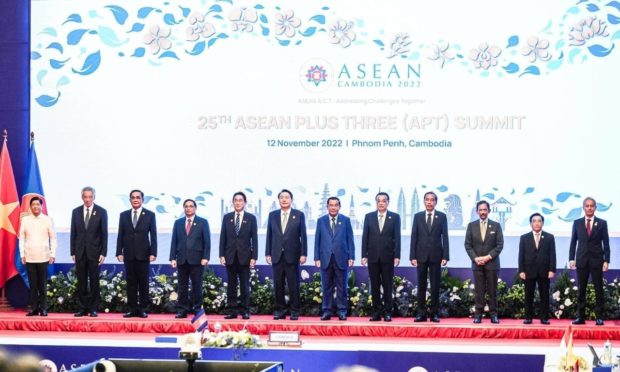
Photos from Office of the Press Secretary’s Facebook
The Asean Summit ended in Phnom Penh on Sunday with regional leaders warning Myanmar’s junta to follow the five-point peace plan or risk being banned from future Asean meetings.
The junta was already banned from attending meetings of Asean, which is facing increasing criticism for a peace plan that has failed to stop violence and civilian killings by junta forces.
The crisis in Myanmar dominated three days of talks between leaders of the Association of Southeast Asian Nations as well as Japan, the United States, China and the United Nations.
Asean delegates confirmed their commitment to the Five-Point Consensus for peace agreed with junta chief Min Aung Hlaing in April last year but said they wanted to see a timeline for its implementation. The peace plan, which calls for an end to violence, has gone largely ignored by Myanmar’s junta as it wages a brutal military campaign to quell nationwide resistance against its rule.
Admitting that “little progress” has been made in implementing the peace plan, Asean leaders urged Myanmar’s military regime to comply with its commitments.
They also decided to forge a timeline “that outlines concrete, practical and measurable indicators” to support the peace plan.
Indonesia’s Foreign Minister Retno Marsudi said Asean’s statement was a clear message of warning to Myanmar’s junta.
The junta has yet to issue a response. It has cited the Covid-19 pandemic and its ongoing battle with armed resistance forces as reasons for the delay in implementing the peace plan.
The summit also discussed tensions on the Korean peninsula and in the Taiwan strait, with non-Asean leaders including South Korea’s President Yoon Suk-yeol and Chinese Premier Li Keqiang joining the talks.
US President Joe Biden, who joined the summit ahead of his highly anticipated meeting with Chinese President Xi Jinping in Bali this week, said the US remains an important partner of Asean.
Biden said Asean countries are the heart of the US Indo-Pacific administration strategy, and vowed to increase strategic partnerships and cooperation to tackle challenges of climate change, food stability, and security, and to build a free, open, flexible and stable Indo-Pacific region.
Cambodian Prime Minister Hun Sen ended the summit by handing over the hammer symbolising Asean chairmanship to President Joko Widodo of Indonesia, which will host the regional bloc next year. Widodo announced the theme of Asean 2023 will be “Asean Matters: The Epicentrum of Growth”.
RELATED STORIES
Myanmar to dominate Asean agenda, but ‘little progress expected’
Marcos Jr.: Enact Asean plan to end ‘protracted suffering’ in Myanmar